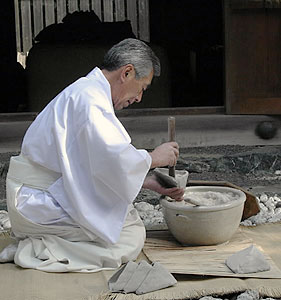Research by Tamara Damberg
SALT
Religion
Salt has been a role in lots of religions. It is often used in rituals and sacrifices by throwing it in the fire. The ancient Egyptians, Greeks and Romans invoked their gods by offering salt and water, and it is said that this was the beginning of Holy Water in the Christian Faith. In Aztec mythology the god of fertility was also the presider of salt and salted water.
In Hinduism salt is seen as a very favorable substance, it is used in religious ceremonies like housewarmings and weddings.
In Jainism (an indian religion) salt is used in combination with raw rice as a sign of their devotion to their gods and salt is sprinkled on a person’s cremated remains before the ashes are buried.
Mahayana Buddhist tradition believes in the power of removing evil spirits with salt. When these people return from a funeral, they throw a pinch of salt over their left shoulder to prevent evil spirits from entering the house.
Shinto (a japanese religion) uses salt for ritual
purification of location and people. Small piles of salt
are also placed on the entrance of establishments to ward off evil and attract patrons.
Salt is also mentioned a lot in Bibles and Holy Books. In the Hebrew Bible salt is mentioned in 35 verses. Salt is mentioned as some sort of curse. However in the New Testament salt is only mentioned in six verses. Jesus calls his followers the “salt of the earth” giving salt a positive meaning. Holy water is also often combined with blessed salt.
In Judaism salt goes hand in hand with bread. They either eat salty bread, or they add salt to the bread. While sharing a bread it is custom to spread salt over it, or dip it in salt to preserve the union between their people and God.
Wicca sees salt as the symbolic element Earth. They believe in the cleansing capacity of salt to get rid of harmful or negative energies. There is almost always a dish of salt and a dish of water on an altar and salt is often used in rituals and ceremonies.

